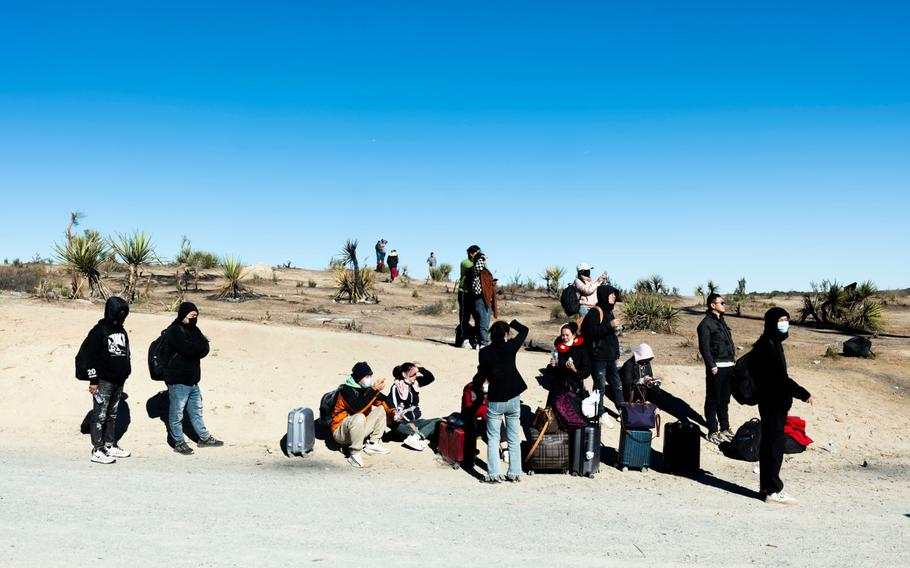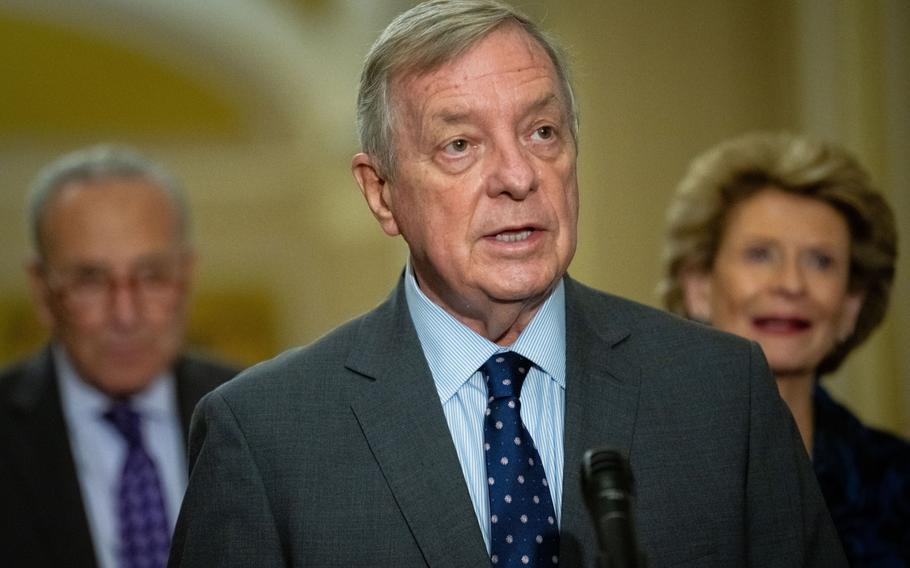
Migrants waiting to be processed by US Customs and Border Protection officers near the U.S.-Mexico border in Jacumba Hot Springs, Calif., on Nov. 7, 2023. (Nicolo Filippo Rosso/Bloomberg)
Republican lawmakers sense political advantage on immigration and are pressing Democrats to accept hardline border restrictions as the price for more U.S. aid to Ukraine.
The surge in migrants crossing the U.S.-Mexico border is emerging as a signature issue in next year’s election, with voters ranking immigration their second most important concern, just after the economy. Pressure to act is building as migrants tax the resources of big cities across the U.S.
Yet Democrats are resisting most of the Republican demands, leaving both sides locked in a standoff and delaying military assistance to help Ukraine at a critical moment in its fight against Russia’s invasion.
Ukrainian President Volodymyr Zelenskyy will plead the case for more aid in person Tuesday to congressional leaders and President Joe Biden. Biden chief of staff Jeff Zients and other White House officials have been in touch with senators from both parties involved in immigration talks, said a person familiar, but the outlook for a deal is nebulous.
“I can see a path, but it’s faint,” Connecticut Sen. Chris Murphy, the lead Democratic negotiator in the talks, said Monday. Complicating matters, many House Republicans have still more stringent demands.
Here’s where negotiations are focused:
Asylum
More than 800,000 claims for asylum have been filed in the U.S. over the past year, an increase of about two-thirds from the previous year, according to the New York Times. Immigration courts are overwhelmed and their overall backlog has grown to more than 2 million cases, more than triple what it was in 2017.
Senate Republicans want to raise the current asylum standard — that applicants have to show a “credible fear” of persecution in their home countries — to quickly weed out weak cases.
A bipartisan group of Senators — Kyrsten Sinema, an Arizona independent, Oklahoma Republican James Lankford and Murphy — made some progress in discussions about raising the asylum threshold.
But the details have been tough to work out, and Democrats rejected proposals they view as too extreme, such as giving the president sweeping authority to close the border to asylum-seekers and blocking asylum access for those who failed to seek protection in other countries en route to the U.S.
Detention, deportation
Republicans want to cut the number of border-crossers who are released freely into the U.S. while they have cases pending in immigration courts and limit the administration’s ability to grant temporary status known as immigration parole. They also want to expand use of fast-tracked deportations known as expedited removal.
Democrats are uneasy about any mass expansion of immigrant detention, particularly involving families, arguing that the restrictive setting can harm children. And they say expanding fast-tracked deportation to non-citizens around the country would terrorize immigrant communities.
Dreamers
Democrats have long aspired to establish a pathway to citizenship for immigrant “Dreamers” who arrived in the U.S. as children. Progressives are sympathetic to them since many have lived in the country for most of their lives and essentially were raised as Americans. Yet they are dependent on temporary work permits and tenuous legal status that is under threat in federal court.
An exchange of tougher border controls for a pathway to citizenship for Dreamers and potentially other undocumented immigrants who have been in the country a long time has always been a cornerstone of any potential broad immigration deal.
Republicans swiftly dispelled any notion that Democrats could use the negotiation to try to address the Dreamers’ hopes for a way to gain U.S. citizenship. Some GOP senators warned Democrats they’d have to take whatever Republicans offered in exchange for unlocking Ukraine funding — a sentiment that incensed Democrats.

Dick Durbin. (Graeme Sloan/Bloomberg)
Political pressure
Republicans have lambasted the White House over its approach to the border and even tried to impeach Homeland Security Secretary Alejandro Mayorkas over it.
Northern cities are buckling under the costs of services for migrants who have decamped there. The projected cost of sheltering migrants in New York City is expected to exceed $12 billion over three years. In Chicago, officials say the migrant crisis accounts for more than a third of the city’s $538 million projected budget deficit.
The public is responding to Republicans’ message. On immigration, registered voters say the GOP does a better job than Democrats by an 18-percentage-point margin, twice the advantage Republicans held two years ago and the highest in polling going back to 2005, according to an NBC News poll taken in September.
Even the Senate’s second-ranking Democratic leader, Dick Durbin of Illinois, on Monday acknowledged a need for changes in border enforcement, saying the current situation “is not sustainable.”
Yet progressives say including major asylum restrictions and increased deportation in a deal would go back on Biden’s 2020 campaign promise to undo Donald Trump’s restrictive immigration agenda. Congressional Hispanic Caucus chair Representative Nanette Barragán and Senator Alex Padilla, both California Democrats, jointly warned such a step would be considered “unconscionable.”
Outlook
Even if the issues are resolved, many House Republicans are demanding much bigger changes such as having asylum seekers remain in Mexico while cases are adjudicated, and expanding electronic verification and deportation of long time undocumented immigrants. Ultra-conservatives want any Ukraine assistance to only be released after migration levels drop.
It is increasingly clear Congress won’t pass aid for Ukraine this year and the best Kyiv can hope for is early in the new year.
Lankford, the chief Republican negotiator, sees no chance of an agreement by the end of the week, when House and Senate are scheduled to leave for their holiday recess. Senate leaders have said they’re willing to stay longer to act on Ukraine aid.
Speaker Mike Johnson who’s planning to adjourn on Thursday said Monday night that the House could come back if an agreement was in the offing, but there had been no offer from the White House.
“If a proposal was sent over and it’s meaningful and reasonable and it looks like we could get consensus I’m sure people would do the job but we’ll have to see,” he said.
With assistance from Steven T. Dennis and Jordan Fabian.
More stories like this are available on bloomberg.com
©2023 Bloomberg L.P.

Migrants after entering the United States through a gap in the border wall in Jacumba Hot Springs, California, US, on Tuesday, Nov. 7, 2023. Mexican President Andres Manuel Lopez Obrador will take a proposal to reduce the flow of migrants up north for discussion with US counterpart Joe Biden after agreeing on a common strategy with other Latin American nations. MUST CREDIT: Bloomberg photo by Nicolo Filippo Rosso ()